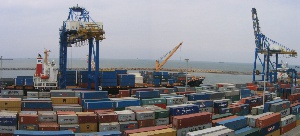Togo has been rated the best, followed by Ghana, in the political commitment at reducing road transport costs and delays significant for trade promotion and facilitation within the 14-nation West African ECOWAS zone.
Mr Bright Gowonu, Programmes Manager of Borderless Alliance, an entity co-advocating the elimination of road transport difficulties and related bottlenecks against the movement of transit trucks and goods in the zone has said. “Our studies on average number of security checkpoints, delays and illegal fee collections regarding vehicles carrying transit goods along main ECOWAS Zone Transport Corridors, has found Togo to have done better,” Mr Gowonu stated.
He was addressing a day cross-border sensitisation seminar on road transport sector challenges within the ECOWAS corridor, inhibiting the promotion of trade and economic activity. It was organised by the Alliance and the World Bank-financed Abidjan-Lagos Corridor Organisation (ALCO), a body geared at ECOWAS zone trade integration in collaboration with Ghana Shippers Authority (GSA).
About 150 personnel of Customs Division of Ghana Revenue Authority (GRA), Ghana Police Service, Ghana Immigration Service (GIS), Haulage Transport Unions, Clearing Agents and State Insurance Corporation attended the seminar. Mr Gowonu urged Ghana to eliminate extortions and related issues on the road to meet the agreement on free trade facilitation in the regional grouping.
Mr Abraham Ocloo, GSA Business Development Advisor, noted that illegal collections and delays in the ECOWAS road corridor increase cost of business and appealed to stakeholders to get committed at eliminating the culture. He said Information Centres established by GSA at entry points have helped in sensitising travellers on entry procedures.
Nii Nikoi Amasa, Corporate Monitoring Manager, Ghana Ports and Harbours Authority and member of the National Trade Facilitation Committee said it is wrong for transit trucks loaded under supervision and sealed at the ports to be stopped unless under suspicion.
Mr Harve De Hardt-Kaffils, Communications Manager, ALCO, a project involving Ghana, La Cote d’ Ivoire, Togo, Benin and Nigeria to reduce transport challenges among them noted that Ghana’s reduction of barriers from 25 to 16 on the Aflao-Elubo road have been of benefit to business across the borders.
Mr Joshua Krakue, Assistant Comptroller of Immigration, said GIS must play its core security role by being diligent in handling persons entering and moving out of the country. He suggested the issuance of a special periodic ECOWAS travel certificates for drivers in charge of transit trucks, to facilitate their faster entries at border crossings.
Mr Ben Beckley, Aflao Sector Commander of Customs commended the organisers for bringing the issues to the fore in the interest of economic integration. During an open forum representatives of Clearing Agents and Haulage Truck Unions said extortions and delays at the checkpoint along the routes had made investment into goods haulage across borders in the sub-region unattractive.
Business News of Sunday, 27 October 2013
Source: GNA

















